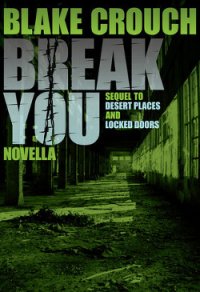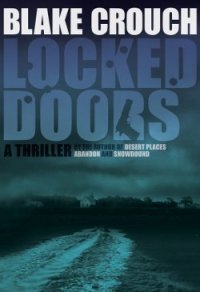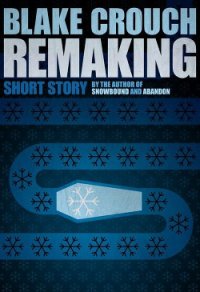Thicker Than Blood - Crouch Blake (лучшие книги онлайн TXT) 📗
"Are you guiltless?"
"I don’t deserve prison."
"How do you know what you deserve?"
"You’re a naive little girl," I said. "You think if you always try to do the right thing, it’ll all work out in the end. You think that don’t you?"
"It’s called hope. What if I do?"
"I hope you’re never faced with some of the decisions I’ve had to make. Where you lose everything no matter what."
I grabbed her .45 from the pew and shoved it into my waistband. We’d be leaving just as soon as I repacked the Osprey.
"You need that optimism," I said. "It protects you from the horror you see. Was what Luther did to the Worthingtons anything less than pure brutality?"
"No. It was awful."
"Did you fabricate a silver lining there?"
"If they had their faith, I believe they’re in heaven."
"I’m sure that’s just what Mr. Worthington was thinking as Luther Kite butchered him. ‘Boy, I’m glad I have this faith.’" I glanced up at the wooden cross mounted to the wall behind the altar. "You’re a Christian?" I asked.
"Yes."
"Tell me. Where is God now? Where was He when Luther savaged that family?"
She glared at me, her wet eyes shining in the firelight.
"I don’t know."
44
MOONLESS and windless, the island brooded: cold, dark, silent. Having left the backpack in the church, we followed the path back to the old general store and turned at the junction onto a southbound trail that would lead us to the middle village ruins in the island’s interior.
We traversed Doctors Creek, passed an abandoned schoolhouse, and entered a thicket of live oaks.
Violet walked ahead of me.
The only sound came from the swish of wet Gortex, the splat of our boots in mud.
The trail narrowed.
We didn’t talk.
All around us the undergrowth rioted, impenetrable, in a state of unkempt anarchy, live oaks dripping, wet branches clawing at our arms and legs. I could hardly see Violet and she could hardly see the path before her. Occasionally she’d veer from the trail into a shrub, sigh, and right herself. I debated going back for the headlamp but decided against it. We’d already hiked at least a quarter of a mile and according to the map the ruins weren’t far ahead.
As we pushed on into the interior, I realized that I was trusting Violet to guide us, my eyes fixed on the back of her boots.
I couldn’t decide if I were more afraid of finding or not finding Luther.
At last we emerged from the thicket and arrived at the edge of a vast marsh.
I whispered for Violet to stop.
We’d reached the ruins.
Just off the trail I noticed what was left of a house—a crumbling stone chimney surrounded by a pile of rotten boards. Other remnants of the village were scattered throughout the neighboring wood. A brick chimney sprouted up from the middle of the marsh, no trace of the house it had warmed more than a century ago.
I told Violet to keep walking.
The trail followed a slim land bridge across the wetland. As we walked, distant splashes and squawks rang out across the water.
Well there’s some old hunting lodges down past the middle village ruins.
I kept hearing Charlie Tatum’s voice and thinking of that passage from Orson’s journal:
Said they have this lodge on a remote island that would be perfect for the administration of painings.
We reentered the thicket on the other side. Scrub pine instead of live oak. A roomier wood.
The trail split and Violet stopped.
"Which way?" she whispered.
"I’m not sure. Let’s keep walking south."
"What are we looking for exactly?"
"A lodge of some sort."
"I don’t think anyone else is on this island, Andrew."
"Yeah, I’m starting to wonder that myself."
We continued southward, the air now perfumed with wet pine and cold enough to cloud our breath.
It was just after nine o’clock when the trail ended, having deposited us on the bank of a wide slough that separated Portsmouth from Evergreen Island. I remembered this feature from the map and my heart sank. If the Kite’s lodge stood on Evergreen we’d have to bushwhack east for half a mile and bypass the slough via the tidal flats that connected these barrier islands. It would take all night.
Eastward, I could see where the backwater eventually emptied after several hundred yards into the flats. The sea lay hidden behind distant dunes.
"Look," Violet whispered.
I turned, gazed back into the wood.
"Do you see it?"
A speck of orange light twinkled somewhere in the pines. It could’ve been a ship on the sound. It could’ve been ball lightning.
"Let’s go," I said. "Pull your hood down so you can listen."
Violet rolled her hood back and pushed her hair behind her ears.
Leaving the path, we struck out into the pines in search of the light. The suction of our boots in the mud seemed positively deafening and the light grew no closer. I had an awful premonition that it would suddenly wink out, stranding us in the pathless dark.
We walked on, faster now between the pines, and for the first time that orange luminescence seemed closer.
I took the .45 from the inner pocket of my rain jacket.
"I see it," Violet said.
We crouched down in a coppice of oleander.
Tucked away in some live oaks at the terminus of a black creek stood a little wood lodge. A lantern or candle (some source of natural firelight) glowed through the only window. A boat was moored to the small dock.
"Is that it?" she asked.
"I have no idea."
We walked on. I was soaked with sweat underneath my raingear.
Within twenty yards of the lodge, I pulled Violet behind a tree and whispered in her ear: "Wait here and don’t move."
I drew back the slide on the .45 and moved quietly toward the structure.
Halfway there I stopped to listen.
The wind had died, the silence absolute save the knocking in my chest.
I crept to the window but because the lodge had been raised several feet off the ground on four-by-fours I couldn’t see inside.
Three deliberate breaths and I walked around to the steps leading up to the front and only door.
At the top I glanced over my shoulder, saw Violet still hunched near the tree.
I put my ear to the door, listened.
Not a sound.
I grasped the doorknob and turned it as slowly as I could, a line of icy sweat trilling down my left side.
With the tip of my boot I nudged the door and let go.
It swayed partly open.
Hinges squeaking.
The only movement inside came from fireshadows on the walls and ceiling.
The furnishings were scanty—a ratty futon, card table bearing dirty plates, a bowl of pistachio shells, a jug of water. The place stunk of scorched eggs and spoiled fish. A candle, almost burned down to the brass, had been set on the windowsill, the sole source of light.
I steadied my hands, knelt briefly on the stoop to rest my trembling knees.
Then I stood, stepped through the threshold, kicked the door all the way open.
Sweet Jesus.
Movement in the right corner.
I swung around, nearly shot Beth Lancing, duct-taped to a folding chair, eyes gone wide with horror, head shaking, hair in shambles, cheeks marbled with bruises and mud.
Lowering the gun, I stepped toward her, reached to pull off the tape covering her mouth, but stopped.
"Beth," I whispered, "J.D. and Jenna are safe. I’m here to take you home to them. Don’t scream when I take the tape off."




